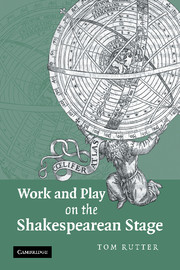Book contents
- Frontmatter
- Contents
- Acknowledgements
- Note on texts and dates
- Introduction
- Chapter 1 Work in sixteenth-century England
- Chapter 2 ‘Vpon the weke daies and worke daies at conuenient times’: acting as work in Elizabethan England
- Chapter 3 ‘Though he be a king, yet he must labour’: work and nobility in Shakespeare's histories
- Chapter 4 ‘We may shut vp our shops, and make holiday’: workers and playhouses, 1599–1601
- Chapter 5 ‘Work upon that now!’: labour and status on the stage, 1599–1610
- Conclusion
- Notes
- Bibliography
- Index
Conclusion
Published online by Cambridge University Press: 22 September 2009
- Frontmatter
- Contents
- Acknowledgements
- Note on texts and dates
- Introduction
- Chapter 1 Work in sixteenth-century England
- Chapter 2 ‘Vpon the weke daies and worke daies at conuenient times’: acting as work in Elizabethan England
- Chapter 3 ‘Though he be a king, yet he must labour’: work and nobility in Shakespeare's histories
- Chapter 4 ‘We may shut vp our shops, and make holiday’: workers and playhouses, 1599–1601
- Chapter 5 ‘Work upon that now!’: labour and status on the stage, 1599–1610
- Conclusion
- Notes
- Bibliography
- Index
Summary
In the last chapter, I identified both continuities and changes in the dramatic treatment of work by the adult and the children's companies after 1601. The adult companies continued to associate themselves (though not exclusively) with London's citizens through depicting manual and commercial work as morally upstanding (The Honest Whore) and compatible with gentle status (The Four Prentices of London), as well as highlighting the perils of idleness and dissolution (The London Prodigal). For their part, the Children of the Chapel satirised the former two claims in Eastward Ho! and rewarded an ostentatiously idle and dissolute character at the end of The Knight of the Burning Pestle. However, the fact that Jasper in the latter play is a paragon of dutiful industriousness and that the eponymous heroes of The Four Prentices of London are sons of the Earl of Bouillon precludes any easy identification of adults or children with particular sectional interests; furthermore, in these years, dramatists began to demonstrate a willingness to question the assumptions on which the companies' divergent treatments of work had been founded. The aristocratic culture of conspicuous leisure comes in for sustained interrogation in A Woman Killed with Kindness, but it is also satirised in Eastward Ho!; conversely, even in The Honest Whore, Candido is as ridiculous as he is impressive.
- Type
- Chapter
- Information
- Work and Play on the Shakespearean Stage , pp. 153 - 157Publisher: Cambridge University PressPrint publication year: 2008



